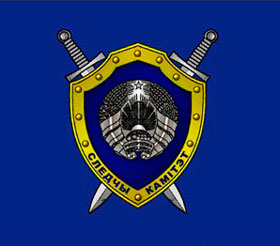Svetlahorsk Investigation Committee reluctant to recognize the guilt of police officers in the death of Aliaksandr Akulich
Svetlahorsk resident
Valiantsina Akulich received another ruling from the Svetlahorsk
District Department of the Investigation Committee about the refusal
to instigate a criminal case on the death of her son Aliaksandr
Akulich in the detention center of the Svetlahorsk District Police
Department in May 2013.
The woman appealed the
previous decision with the help of lawyers of the HRC "Viasna".
In July this year she filed an appeal about the disagreement with the
refusal to instigate a criminal case to the district prosecutor's
office and the district department of the Investigation Committee. On
1 August the head of the Svetlahorsk District Department of the
Investigation Committee Aliaksandr Prykalotsin abolished the ruling
about the denial in bringing the criminal case, dated 9 June 2013,
and resumed the investigation check-up. Moreover, an additional
forensic examination was appointed on Valiantsina Akulich's motion.
Aliaksandr Akulich's mother tried to appoint an additional
examination for solving the question whether there was a directed
relation between the death of her son and the non-timely rendering of
medical aid by the officers of the Svetlahorsk District Police
Department A. Bachko and R. Stseshankou, who kept duty in the
detention center that day. However, again refusing to bring a case
“due to the absence of corpus delicti in the actions of the police
officers”, investigator Viachaslau Petachenka doesn't assess their
actions. He issues his ruling on 10 August, without waiting for the
results of the examination which was completed on 21 August.
Meanwhile, there are enough facts
he could pay attention to. as it follows from
the materials of the check-up, the questioned paramedic
of the ambulance
station explains that
on 26 May 2012 she
received a call from the police station at 1.05 a.m., and on arriving
at the DPD at 1.10 a.m. she saw a man who was lying dead in the
corridor of the detention center. The questioned duty policeman of
the detention center Stseshankou explained, that he and
his partner Bachko decided to lead Akulich
out of the cell “in order to bring him to the investigation
office and call an ambulance in the case of neccessity, because his
behavior was characteristic for an alcoholic
psychosis”. They also decided to use
physical force towards Akulich. According to Stseshankou, it took
place at about 1 a.m., 5-10 minutes before the death of the detainee.
However, ass it is indicated in the case materials, according to a
record in the register of the use of physical force and police gear,
they were used towards Mr. Akulich starting from 0.30 a.m. What hides
behind such discrepancies in the time? Probably the fact, that
Stseshankou and Bachko could beat a man in an inadequate state for
half an hour instead of rendering him timely medical aid. It's quite
interesting that his mother and the human rights defenders pointed at
this circumstance in their appeal, but neither the investigator
Petachenka, nor the DPD officers who gave explanations during the
check-up, paid any attention to it.
In her statement about
the disagreement with the denial in the instigation of a criminal
case, Valiantsina Akulich asked to put concrete questions for
additional examination:
1.
Was the medical aid rendered to A. Akulich timely? If not, what were
the consequences of the untimely medical aid to him?
2. Were
there any opportunities to prevent the illness A. Akulich was
diagnosed with, or its exacerbation?
3. What urgent medical aid
did A. Akulich need since 10 p.m. on 25 May 2012?
4. Could such
urgent medical aid be rendered to A. Akulich by an ambulance brigade
or in a medical institution?
5. Was the death of A. Akulich
inevitable if the medical aid was rendered timely?
6. Did
A. Akulich have any contraindications to
medical treatment?
It
should be noted that in the presentation of its findings the
commission of experts has demonstrated a great
cynicism. They answered the first question in
the following way: “No medical aid was rendered to A. Akulich as
his biological death was registered on the arrival of the ambulance
brigade”. What concerns all other questions, the answer was: “The
forensic expert commission doesn't deal with any prognoses, but just
assesses objective facts, that's why it is not possible to answer
these questions”.
This case remains in the focus of
attention of the Human Rights Center “Viasna”, who will continue
helping Valiantsina Akulich in finding the truth in the situation
with the death of her son.


















